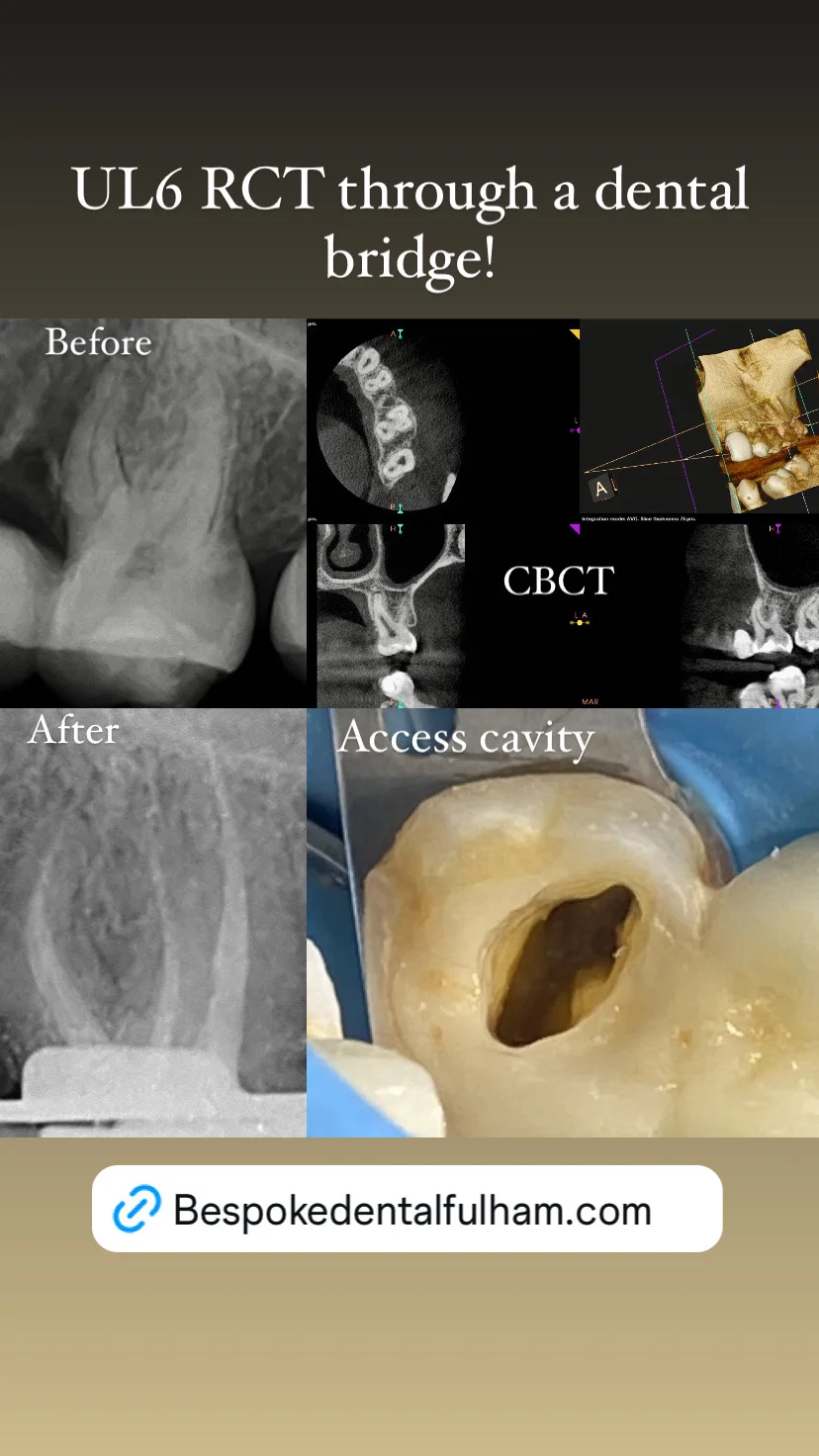Going to the dentist has never been seen as a pleasurable experience and, amongst uncomfortable and painful treatments, Root Canal Treatment has a special mythological status for agony. That is all ancient history. Today, given the latest technology used in dentistry, this procedure is almost pain-free. In fact, getting a root canal treated early may protect the tooth you already possess, help avoid a future infection, and eliminate the toothache in the long term. Despite this reality, the myths are so strong that most people wish to avoid treatment – even when the infection is giving them pain – in the vain hope that the infection will just go away. However, once an infection is inside the tooth there is very little choice if the greater discomfort of an extraction is to be avoided.
Table of Contents
ToggleWhat is Root Canal Treatment?
Root canal treatment addresses infections in the tooth’s pulp (the innermost layer of the tooth containing nerves and blood vessels). When infected due to decay, injury, or cracks, the pulp can cause severe pain and even lead to life-threatening complications if untreated.
When is Root Canal Treatment Required?
But how can you tell when a root canal treatment is required for a tooth? We discuss below the signs that may warrant the procedure, the causes and why action should be taken sooner rather than later.
1. Persistent Pain
The most easily recognizable symptom indicating that you may need a root canal is sharp, throbbing pain in your tooth. Not all tooth pains are candidates for root canals, and sometimes, even a single tooth will have a dull ache at one time and a sharp pain at another. All this is a sign that something deeper is happening in the tooth.
What causes the pain? Inside your tooth is a soft tissue called the pulp, composed of nerves, blood vessels, and soft tissue. Some factors that precipitate pulpitis (hence severe pain) include infected or inflamed pulp due to decay, trauma or many dental procedures. This pain may increase when you eat, drink, or put pressure on the affected tooth. The pain may also spread to your jaw, ear, or other teeth close to it; thus, it may be hard to pinpoint that specific tooth.
Why you shouldn’t ignore it: pain is the body’s signal that there is a problem, so learning to pay attention to it is important. If left untreated, the infection of your tooth is likely to spread to tissues surrounding the affected area, resulting in an abscess or even the loss of bone – undermining the foundations of not just the tooth in question but those next to it as well. Sometimes, the infection can go deeper and impact your general health.
2. Tooth Sensitivity
Tooth sensitivity is normal and quite ordinary, especially a few days after going to the dentist or if the enamel of your respective tooth has worn thin. If you have a sensation of severe burning after eating hot or cold products, it may mean that the nerves found inside the tooth are exposed or infected.
What causes temperature sensitivity? Self-generated stimuli relate to the physiological state of a tooth, and for some reason, the pulp ceases to have a normal response to hot or cold stimuli. These damaged nerves may also overreact to hot or cold; the feeling may remain even after the cause is gone. This is usually a sign that the pulp is either dying off or has already died.
Why you shouldn’t ignore it: unlike some other tissue, pulp tissue will not regenerate after it is damaged. Increased sensitivity means the infection or inflammation is coming on or becoming more severe. If left undiagnosed and ignored, the issue grows to involve the rest of the specific tooth and/or the adjacent tissues. It will then necessitate an even more complex procedure than a root canal treatment.
3. Swollen Gums
Some signs that you may need a root canal treatment include sensitivity and inflammation of the gum near the affected tooth. Of course, this may be due to several causes, like gum diseases or food that may get stuck between the teeth and the gum. Still, if the swelling remains fixed and there is no improvement even after practicing good dental health, it may be due to an underlying problem with the tooth’s root.
What causes swollen gums? When a root canal becomes infected, the infection spreads to the gum and the teeth surrounding the infected tooth. The gums may become painful, red, and swollen as the disease progresses to the next stage. In some instances, patients may also experience redness in the gum and a small pimple-like bump commonly referred to as a dental abscess through which pus may ooze.
4. Darkening or Discoloration of the Tooth
If one of the teeth in your mouth has become yellow or stained, it can indicate a dying or dead tooth, which will need a root canal. There are many causes of tooth discoloration; however, if it is localised to a single tooth and is associated with signs such as pain or swelling, there must be something wrong.
What causes tooth discoloration? This usually happens if there is pulpy tissue inside the tooth, which has suffered injury or infection and died and has, as a result, turned black. This darkening is due to biochemical changes that take place within the tooth’s tissues, and this is an indication that the tooth may be dead. Tooth injuries may also lead to staining when the respective trauma affects blood circulation around the pulp.
This is not a simple case of aesthetics: if a tooth is discolored it means it is no longer healthy. If the infection or damage is left untreated, it can extend to the other parts of the mouth. The root canal treatment aims to save the tooth in preparation for protecting it with a natural-looking a crown.
5. Prolonged Sensitivity to Pressure
If the root’s sensitivity extends to pressure or pain when you bite down or when a finger or object lightly touches it, that may indicate that you need a root canal treatment. This sensitivity may be characterized as a mild tingling sensation, or a throbbing pain aggravated by any pressure on the tooth.
What causes pressure sensitivity? If the pulp, which is the inside of the tooth, is inflamed or infected, then the tooth will become sensitive to pressure. The infection may also spread to include the bone and the hard tissues surrounding it, making the tooth more sensitive to movement or force.
Conclusion
It’s important to know when signs may indicate that you require a root canal treatment to ensure proper dental health – and prevent the infection from spreading to gums and bone. Therefore, it’s essential to recognize symptoms such as persistent pain, sensitivity, swelling and even tooth discoloration. The longer you let the problem linger, the more likely you will lose your natural tooth and develop other issues which are more expensive to treat or which could result in permanent bone loss.
Even though root canal surgeries are feared so much, it’s worth understanding they’re a safe way of easing pain, preventing further infection and conserving teeth. If you feel or experience any of the above symptoms, you should arrange an appointment with your dentist to advise you on what must be done. Take care of your teeth now when you are still young and ready to face the world – and thank yourself later!




